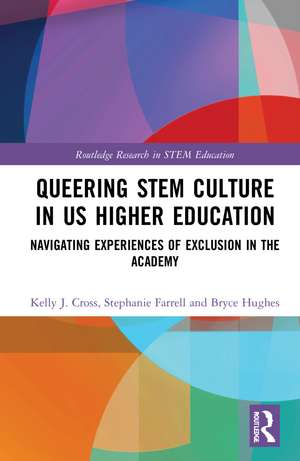Queering STEM Culture in US Higher Education: Navigating Experiences of Exclusion in the Academy: Routledge Research in STEM Education
Editat de Kelly J. Cross, Stephanie Farrell, Bryce Hughesen Limba Engleză Paperback – 29 ian 2024
Offering contributions from students, faculty, practitioners, and administrators, the volume highlights prevailing issues of heteronormativity and marginalization across a range of STEM disciplines. Autoethnographic accounts place minority experiences within the broader context of social and cultural phenomena to reveal subtle and overt forms of exclusion, and systematic barriers to participation in STEM professions, academia, and research. Finally, the book offers key recommendations to inform future research and practice.
This volume will benefit researchers, academics, and educators with an interest in higher education, engineering education, and the sociology of education more broadly. Those involved with diversity, equity, and inclusion within education, queer theory, and gender and sexuality studies will also benefit from this volume.
| Toate formatele și edițiile | Preț | Express |
|---|---|---|
| Paperback (1) | 216.03 lei 6-8 săpt. | |
| Taylor & Francis – 29 ian 2024 | 216.03 lei 6-8 săpt. | |
| Hardback (1) | 1043.13 lei 6-8 săpt. | |
| Taylor & Francis – 28 iun 2022 | 1043.13 lei 6-8 săpt. |
Preț: 216.03 lei
Preț vechi: 333.28 lei
-35% Nou
Puncte Express: 324
Preț estimativ în valută:
41.37€ • 42.63$ • 34.66£
41.37€ • 42.63$ • 34.66£
Carte tipărită la comandă
Livrare economică 25 februarie-11 martie
Preluare comenzi: 021 569.72.76
Specificații
ISBN-13: 9780367769918
ISBN-10: 0367769913
Pagini: 320
Ilustrații: 6
Dimensiuni: 152 x 229 mm
Greutate: 0.45 kg
Ediția:1
Editura: Taylor & Francis
Colecția Routledge
Seria Routledge Research in STEM Education
Locul publicării:Oxford, United Kingdom
ISBN-10: 0367769913
Pagini: 320
Ilustrații: 6
Dimensiuni: 152 x 229 mm
Greutate: 0.45 kg
Ediția:1
Editura: Taylor & Francis
Colecția Routledge
Seria Routledge Research in STEM Education
Locul publicării:Oxford, United Kingdom
Public țintă
PostgraduateCuprins
1: What Do We Know and Why Should We Support Queer and Trans People in STEM?
Bryce E. Hughes, Stephanie Farrell, and Kelly J. Cross
Part I: Queer Students: Where do I fit in STEM?
2: I am Gay, Not Invisible!
Miguel Moore
3: Transcending the Margins and Boundaries as Latin-American Engineer
Héctor E. Rodríguez-Simmonds
4: A Call to Make Queer Erasure, Violence, and Battle Fatigue in STEM Visible
D.C. Beardmore
Part II: Queer Staff: How Can I Create Safe Spaces for Queer People in STEM?
5: Navigating and Celebrating Your Otherness to Succeed as a Queer Person in STEM
Robyn Sandekian
6: Local Minima and Maxima in Trans-STEM Affirmations
Kyle Trenshaw
Part III: Queer Faculty: How Can I Build Community for Queer People in STEM
7: Invisible and Exhausted on the Margins of Academia
Zoe Reidinger
8: Queer STEM Parenting Made me a Better Teacher/Instructor
Stephen Podowitz-Thomas and Erjia Yan
9: Being Queer Taught Me How to Teach
Anthony Butterfield
10: Empathy, Sympathy, and Accountability
Aric Bryant
11: Building a Village to Manage my Triple Threat Multiple Identities
Kelly J. Cross
Part IV: Queer Allies, Allyship, and Advocates: How Can I Support Queer People in STEM?
12: Can You See Me Now: Being a Black Queer Man in STEM
Chris Carr and Darryl Dickerson
13: My Evolution Over 40 Years in Higher Education: From Silence in the Closet to Out and Evolving
Karen P. DePauw and Kelly J. Cross
14: The Act of Embrace as Queer Resistance in Engineering
Donna Riley
15: My Ongoing Journey through Allyship
Adrienne R. Minerick
16: What Does It Mean and Where Do We Go from Here?
Stephanie Farrell, Kelly J. Cross, and Bryce Hughes
Bryce E. Hughes, Stephanie Farrell, and Kelly J. Cross
Part I: Queer Students: Where do I fit in STEM?
2: I am Gay, Not Invisible!
Miguel Moore
3: Transcending the Margins and Boundaries as Latin-American Engineer
Héctor E. Rodríguez-Simmonds
4: A Call to Make Queer Erasure, Violence, and Battle Fatigue in STEM Visible
D.C. Beardmore
Part II: Queer Staff: How Can I Create Safe Spaces for Queer People in STEM?
5: Navigating and Celebrating Your Otherness to Succeed as a Queer Person in STEM
Robyn Sandekian
6: Local Minima and Maxima in Trans-STEM Affirmations
Kyle Trenshaw
Part III: Queer Faculty: How Can I Build Community for Queer People in STEM
7: Invisible and Exhausted on the Margins of Academia
Zoe Reidinger
8: Queer STEM Parenting Made me a Better Teacher/Instructor
Stephen Podowitz-Thomas and Erjia Yan
9: Being Queer Taught Me How to Teach
Anthony Butterfield
10: Empathy, Sympathy, and Accountability
Aric Bryant
11: Building a Village to Manage my Triple Threat Multiple Identities
Kelly J. Cross
Part IV: Queer Allies, Allyship, and Advocates: How Can I Support Queer People in STEM?
12: Can You See Me Now: Being a Black Queer Man in STEM
Chris Carr and Darryl Dickerson
13: My Evolution Over 40 Years in Higher Education: From Silence in the Closet to Out and Evolving
Karen P. DePauw and Kelly J. Cross
14: The Act of Embrace as Queer Resistance in Engineering
Donna Riley
15: My Ongoing Journey through Allyship
Adrienne R. Minerick
16: What Does It Mean and Where Do We Go from Here?
Stephanie Farrell, Kelly J. Cross, and Bryce Hughes
Notă biografică
Kelly J. Cross is an Assistant Professor of Chemical and Materials Engineering at University of Nevada Reno, USA.
Stephanie Farrell is a Professor and Founding Department Head of Experiential Engineering Education at Henry M. Rowan College of Engineering, Rowan University, USA.
Bryce E. Hughes is an Assistant Professor of Adult & Higher Education at Montana State University, USA.
Stephanie Farrell is a Professor and Founding Department Head of Experiential Engineering Education at Henry M. Rowan College of Engineering, Rowan University, USA.
Bryce E. Hughes is an Assistant Professor of Adult & Higher Education at Montana State University, USA.
Descriere
Adopting an intersectional lens, this timely volume explores the lived experiences of members of the queer and trans community in post-secondary STEM culture in the US to provide critical insights into progressing socially just STEM education pathways.














